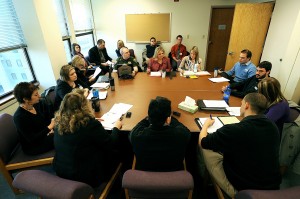This is a fascinating story…………..
How Sexual Deviance Could Have Crippled Alcoholics Anonymous
FEB 17 2012, 11:04 AM ET
Instead of fight for her mother’s inheritance—and risk exposing her sexuality—Felicia Gizycka dropped a lawsuit to protect a developing AA.

Editor’s Note: This is the third in a three-part series from Amanda Smith about the drinking life of Countess Felicia Gizycka, daughter of famed newspaper editor Cissy Patterson, and the other women involved in the early Alcoholics Anonymous movement.
In 1943, Countess Felicia Gizycka severed relations with her mother, the notorious Washington, D.C., newspaper publisher and Chicago Tribune heiress, Cissy Patterson, in what would prove to be the last of the many vicious “drunken rows” they had engaged in over the previous 20 years. Several months later, through her psychiatrist, Dr. Florence Powerdermaker, Felicia was introduced to “Bill W.” and his small, but growing fellowship, Alcoholics Anonymous, in New York City. For the first time in her life Felicia experienced a sense of community and belonging. In her sponsor, Marty Mann, Felicia had found a stalwart lifelong friend. By the end of the Second World War, Felicia had committed herself to a life in recovery.
After their mother-daughter “divorce,” there had been almost no communication between Felicia Gizycka and Cissy Patterson, a Chicago Tribune heiress and the publisher of Washington Times-Herald, the most widely read newspaper in the nation’s capital. As a result, the telegram Cissy received from her estranged daughter in the spring of 1947 sparked more surprise — and suspicion — than it kindled any hope of reconciliation. In light of Mrs. Marty Mann’s upcoming lecture engagements in Washington, Felicia wondered, could her close friend and A.A. sponsor stay at Cissy’s mansion on Dupont Circle? “Marty Mann was for a time the head of the Women’s Division of Alcoholics Anonymous and the only person I ever knew who had great influence on Felicia,” Cissy explained shortly afterward in a letter to her reactionary cousin, Colonel Robert Rutherford McCormick, publisher of the Chicago Tribune. “Well, that would be all right, too,” she continued, betraying her anxiety as to the exact nature and extent of the proposed guest’s sway over her daughter, “if Marty were not a notorious lesbian, and that is rather hard to swallow.”
Perhaps honoring the many efforts that friends had made to reconcile mother and daughter over the years, perhaps for other reasons, Cissy Patterson did invite Marty Mann to stay at her home on Dupont Circle, graciously placing her household staff as well as her personal secretary at her guest’s disposal. For reasons that go unrecorded, however, the hostess was absent while the friend and mentor who had so profoundly changed her daughter’s life was in town.
On her rigorous national lecture tours, Mrs. Marty Mann repeated what would become a familiar refrain: “We must overcome the stigma of sin that has been fastened upon the alcoholic if we are to get anywhere.” But while she and her colleagues made sweeping headway in dissociating alcoholism from venality in the popular mindset, Mann was deeply aware that the blossoming organizations to which she had devoted her life stood to be irrevocably blighted by any taint of what was considered at the time to be “sexual deviance.”
As a result, already burdened with the public-relations encumbrances of being a recovering alcoholic and a woman, she took careful steps to prevent her sexual orientation from becoming known outside of her circle of close friends, or publicly associated either with her work for the National Committee for Education on Alcoholism or with the Alcoholics Anonymous movement generally. Indeed, as her biographers Sally and David R. Brown put it, in her distinguished professional life “Marty’s use of the title Mrs. served the purpose of blurring her real orientation.” Within the necessarily insular gay and lesbian communities of Manhattan and Fire Island, Mann and Priscilla Peck were known as a committed couple. To outsiders, they were “friends” and “roommates.” They did nothing to hide the fact that they lived together; indeed, their unmarried, heterosexual counterparts did so customarily for the sake of economy and safety. By the early 1950s the couple would sell the cottage at Cherry Grove where Felicia had been a constant presence over the preceding decade. As Fire Island developed a reputation as a gay and lesbian summer retreat during those same years, Marty arrived at the conclusion that she could not risk the exposure that her continued presence there might occasion. Such fears were legitimate inasmuch as she and her circle appear to have been threatened with exposure, directly or indirectly, during Felicia Gizycka’s internationally sensationalized efforts to break her mother’s will in the autumn and winter of 1948-49.
Complete article-
http://www.theatlantic.com/health/archive/2012/02/how-sexual-deviance-could-have-crippled-alcoholics-anonymous/252700/
All 3 articles
http://www.theatlantic.com/amanda-smith



